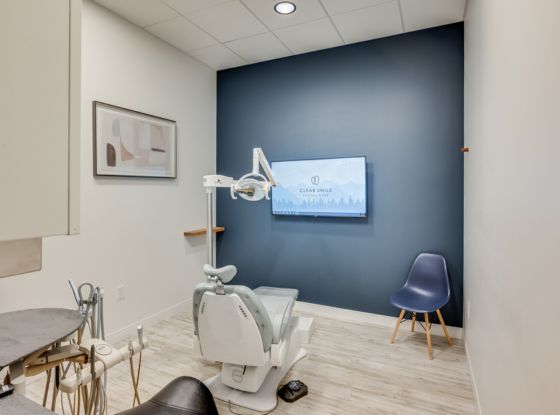How to Handle a Knocked-Out Tooth

How to Handle a Knocked-Out Tooth at Clear Smile Dental Care
A knocked-out tooth is one of the most alarming dental emergencies you can experience. Whether caused by an accident, sports injury, or fall, losing a tooth can be both painful and distressing. However, the way you react immediately after the incident can greatly increase the chances of saving the tooth and restoring your smile. If you find yourself in this situation, it’s essential to know the right steps to take. At Clear Smile Dental Care, we’re here to guide you through this process and help you understand the best actions to take when you experience a knocked-out tooth.
1. Stay Calm and Act Quickly
First and foremost, try to stay calm. While a knocked-out tooth can seem terrifying, swift and careful action can make all the difference in saving the tooth. The sooner you get to a dentist, the better the outcome.
Call Your Dentist Immediately
If you experience a knocked-out tooth, your first move should be to call your dentist. At Clear Smile Dental Care, the best dentist in Highlands Ranch, CO, we prioritize dental emergencies and will do everything we can to get you in for a visit as quickly as possible. A prompt response is critical for replanting the tooth successfully. If it’s after hours, our team will provide guidance on next steps.
2. Find the Tooth
After the tooth has been knocked out, the next step is to locate it. Gently pick up the tooth by the crown (the part you chew with), avoiding touching the root as much as possible to prevent damage to the delicate cells. Be careful not to scrub or clean the tooth vigorously, as it can affect its ability to reattach to the socket.
3. Clean the Tooth (If Necessary)
If the tooth is dirty, rinse it gently under lukewarm water. Avoid using soap, disinfectants, or chemicals, as these can damage the tooth. It’s important not to scrub the tooth, as doing so can damage the root cells needed for reattachment.
4. Try to Reinsert the Tooth
If possible, gently try to place the tooth back into its socket. This can help keep the tooth alive until you get to the dentist. Hold the tooth in place by biting down gently on a clean cloth or gauze. However, do not force the tooth back into place. If it doesn’t go in easily, do not continue to attempt reinsertion.
If reinserting the tooth isn’t possible, don’t worry—there are still ways to save it.
5. Store the Tooth Properly
If reinsertion is not an option, the next best thing is to keep the tooth moist. Place the tooth in a container with milk or saline solution, if available. Avoid storing it in water, as this can damage the root cells. If milk or saline solution isn’t available, place the tooth in your cheek pouch (between your gum and cheek) or use a clean cloth to keep it moist.
If you cannot find anything to store the tooth in, don’t hesitate to call your dentist for advice. They may recommend alternative methods of storage, such as using a saline solution or a special tooth preservation kit.
6. Get to the Dentist as Soon as Possible
The next critical step is to visit your dentist as soon as possible. The longer you wait, the lower the chances of successfully saving the tooth. Ideally, you should see a dentist within 30 minutes of the incident, though teeth can sometimes be reattached successfully even if you arrive a little later. At Clear Smile Dental Care, we offer emergency dental services and prioritize urgent cases.
7. Treatment Options
Once you arrive at the dental office, the dentist will evaluate the situation and determine the best course of action. The treatment for a knocked-out tooth will depend on several factors, including the time elapsed since the injury and the condition of the tooth and surrounding tissues. In some cases, the tooth may be reinserted and splinted into place to allow it to heal and reattach. In other cases, if the tooth cannot be saved, the dentist may recommend a dental implant, bridge, or other restorative options.
8. Aftercare and Follow-Up
After replanting a knocked-out tooth, your dentist will provide detailed instructions for at-home care. You may be prescribed pain relievers or antibiotics to reduce the risk of infection. Additionally, your dentist will schedule follow-up appointments to monitor the healing process and make sure the tooth is properly reattaching to the socket.
9. Preventing Future Tooth Injuries
While accidents happen, there are steps you can take to reduce the risk of a tooth injury in the future. Wearing a mouthguard during sports or high-risk activities can protect your teeth from trauma. Additionally, avoiding chewing on hard objects and maintaining good oral hygiene can help keep your teeth strong and healthy.
Contact Us
A knocked-out tooth can be a stressful and alarming experience, but knowing what to do can increase your chances of saving the tooth. If you or someone you know experiences this type of dental emergency, remember to act quickly and follow the proper steps. At Clear Smile Dental Care, the best dentist in Highlands Ranch, CO, we are committed to providing prompt, effective care in emergencies. If you have any questions or need assistance, don’t hesitate to contact us right away. We’re here to help restore your smile.




